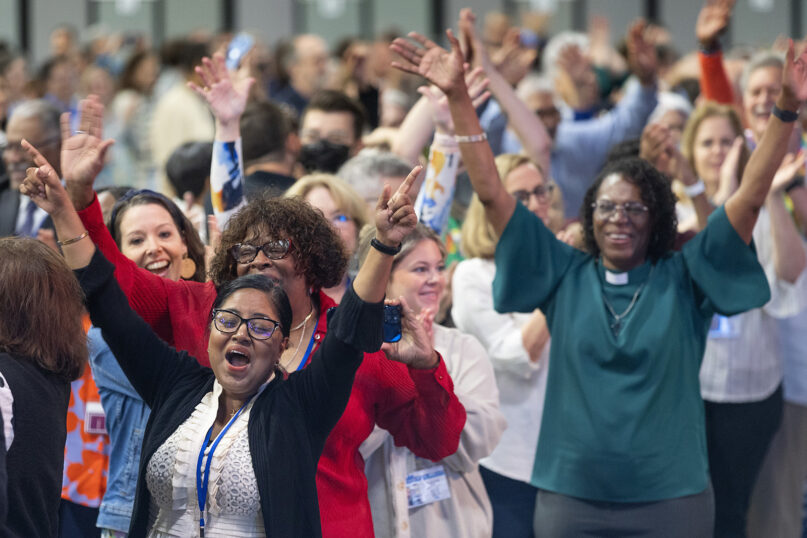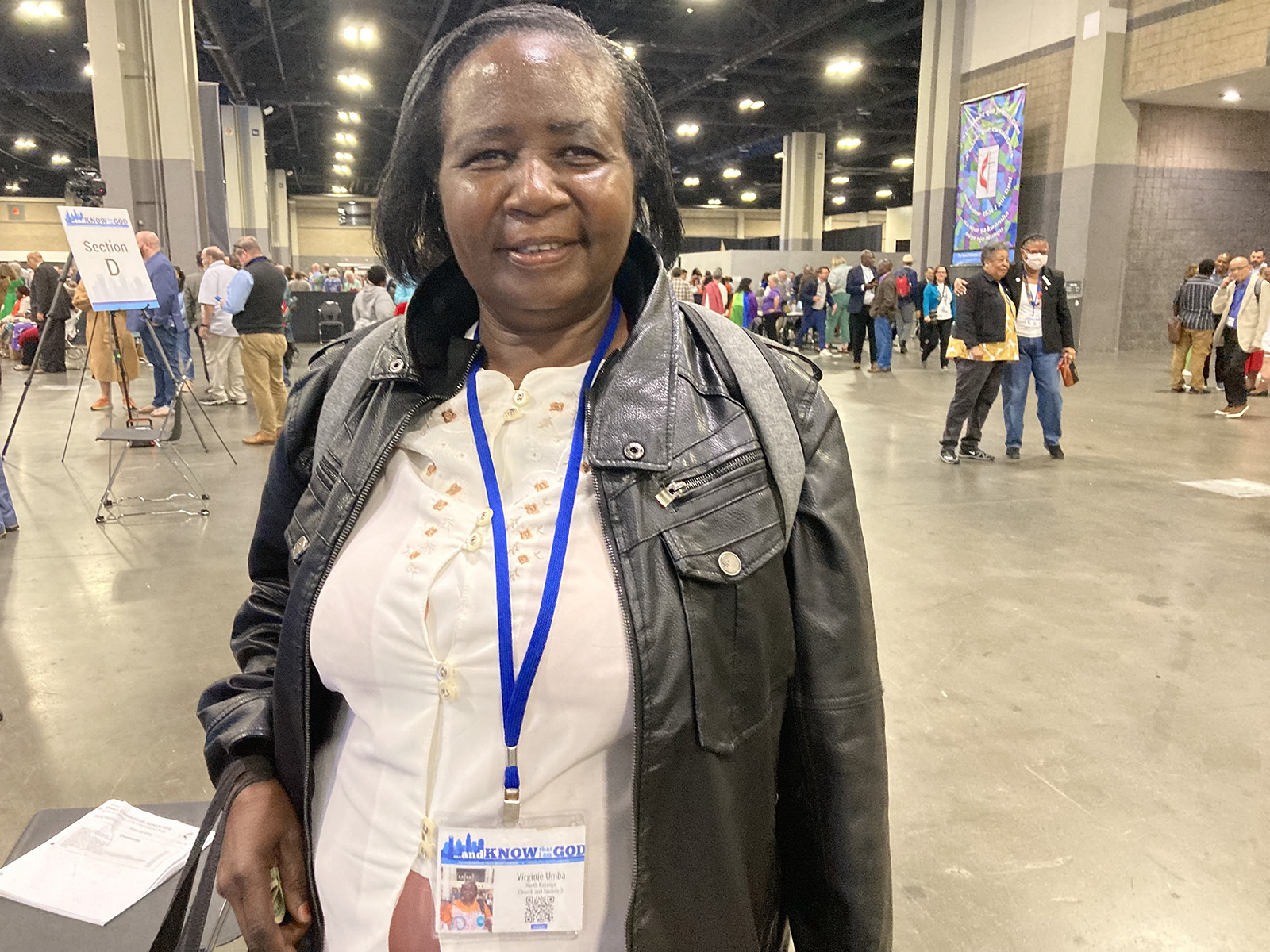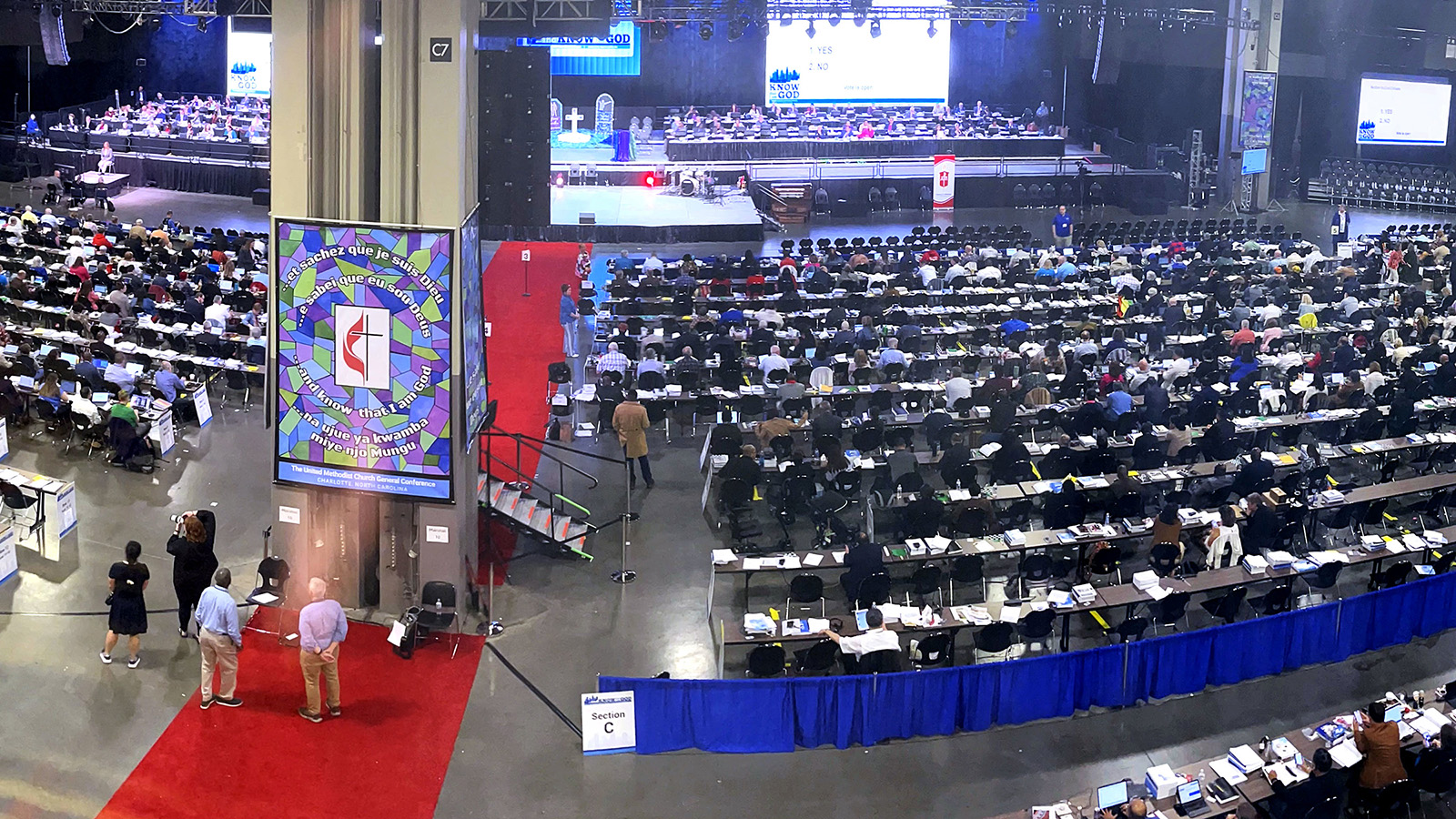The reversals came in the wake of a schism that saw the departure of a quarter of its US churches — more than 7,600 congregations — over the past five years.

Delegates, visitors and staff of the 2024 United Methodist General Conference in Charlotte, N.C., dance in the aisles following morning worship on the final day of the conference, Friday, May 3, 2024. (Photo by Mike DuBose, UM News)
May 3, 2024
By Yonat Shimron
CHARLOTTE, North Carolina (RNS) — United Methodists concluded their General Conference on Friday (May 3) by removing the last barriers to full equality of LGBTQ+ members in the life of the church.
After repealing a 52-year-old declaration on Thursday that the practice of homosexuality is “incompatible with Christian teaching,” delegates on Friday went further, eliminating a passage in their Book of Discipline, or church law, that states: “Ceremonies that celebrate homosexual unions shall not be conducted by our ministers and shall not be conducted in our churches.”
They also eliminated provisions that would have charged clergy with immorality if they were not “faithful in a heterosexual marriage” or “celibate in singleness.” Instead, delegates supported adding a requirement of integrity in all personal relationships.
Earlier in the week they dropped a ban on the ordination of gay clergy. Most of the measures passed by a 3-1 margin.
The effect of all those measures was to expunge from the rulebook all punitive measures against LGBTQ+ people, a striking change for a denomination. The reversals came in the wake of — and were in part made possible by — a schism that saw the departure of more than 7,600 congregations, or about a quarter of its U.S. churches, over the past five years.
In striking its punitive language on homosexuality, the 11 million-member United Methodist Church joins the majority of the nation’s liberal Protestant denominations, which have extended full equality to LGBTQ+ members in recent decades.
Unlike other liberal U.S. Protestant groups, however, the United Methodist Church is a global denomination, with a presence on four continents, and it remains far from clear how churches in Africa and across the Philippines will respond to the bold new policy measures passed in Charlotte this week.

Virginie Umba at the 2024 United Methodist General Conference in Charlotte, N.C., Friday, May 3, 2024. (RNS photo/Yonat Shimron)
“We are not happy,” said Virginie Umba, a pastor from the Republic of the Congo. “In American society, (homosexuality) is OK. In my country it is not. Our church will have a problem if they put this in the Book of Discipline.”
Homosexuality is illegal in more than two dozen African countries, and many overseas clergy worried whether the relaxing of prohibitive policies on LGBTQ+ people would put their churches in direct conflict with government laws.
The differing church views on homosexuality were evident in the conference’s deliberations over the definition of marriage. On Wednesday, a Zimbabwean delegate proposed an amendment to the definition that acknowledged that marriage is a union between a man and woman, adding that it can also be a union between “two adult persons of consenting age.”
That amendment was overwhelmingly agreed to by delegates as a way to accommodate Methodists in Africa. But it is not clear if it will be enough to sway United Methodists in more socially conservative regions.
The denomination did pass a series of measures to restructure the worldwide denomination to give each region greater equity in tailoring church life to its own customs and traditions, a plan called “regionalization.” If ratified by two-thirds of delegates to its numerous annual conferences around the world over the next year, the restructuring would allow church regions to write their own rules on sexuality. But the church has tried to regionalize its work before and it has failed. It’s unclear if it it will succeed this time.
Churches outside the U.S. were not eligible to exit the denomination under the disaffiliation plan that saw American churches depart with minimal cost. Two dissenting groups — Good News Magazine and the Wesleyan Covenant Association — attended the conference as observers to try to help African delegates to push for a disaffiliation plan for congregations abroad.
“This seems like a matter of simple justice to extend that disaffiliation option to them as well,” said Scott Field, president of the Wesleyan Covenant Association. They were not successful.

Over 700 delegates to the 2024 United Methodist General Conference work on church business in Charlotte, N.C., Friday May 3, 2024. (Photo by Larry McCormack, UM News)
The WCA brought a group of 27 observers to Charlotte, including nine Africans. Delegates instead voted to eliminate from its rulebook the pathway for disaffiliation that was created in 2019 for U.S. churches.
As they left the Charlotte Convention Center Friday, the United Methodist Queer Delegate Caucus could credibly claim an overwhelming victory.
“We met all the goals that we were aiming for this time,” said Austin Adkinson, pastor of Light of the Hill United Methodist Church in Puyallup, Washington, a gay man and a delegate to the conference. “We didn’t get an affirmation, but for the sake of moving forward as a denomination, we wanted to get this far this time. It was an exciting day for the church, and we can’t wait to live into it.”
The large gay presence at the conference celebrated their accomplishments at a Wednesday evening singalong in the cavernous sanctuary of First United Methodist Church in downtown Charlotte.
They also wasted no time in recognizing the historic shift they made. After eliminating a ban on funding for LGBTQ+ affinity groups or ministries, Ashley Boggan, who heads the church’s archives and history commission, announced that its executive committee has approved the creation of a Center for LGBTQ+ United Methodist Heritage.
“This center,” Boggan said, “will allow us to intentionally seek out, preserve, and tell the stories of those whose voices, ministries, and witness have, for far too long, been cast aside and silenced.”
No comments:
Post a Comment